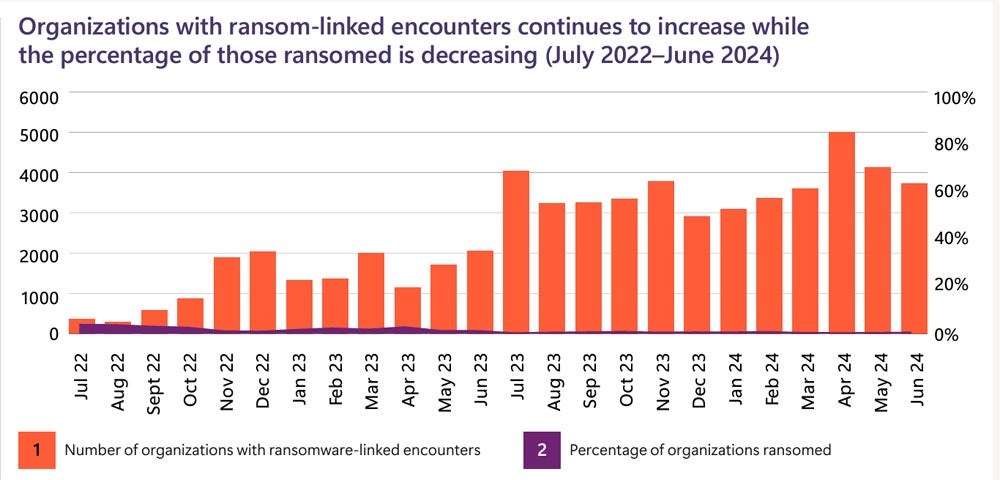The variety of tried ransomware assaults on Microsoft prospects globally have grown dramatically within the final 12 months, in response to Microsoft’s Digital Protection report, launched on Oct. 15. Nonetheless, developments in automated assault disruption applied sciences have led to fewer of those assaults reaching the encryption stage.
Microsoft reported 600 million cybercriminal and nation-state assaults occurring day by day. Whereas ransomware makes an attempt elevated by 2.75 instances, profitable assaults involving information encryption and ransom calls for dropped by three-fold.

Important assault varieties embrace deepfakes, e-commerce theft
Microsoft says it “tracks greater than 1,500 distinctive risk teams — together with greater than 600 nation-state risk actor teams, 300 cybercrime teams, 200 affect operations teams, and lots of of others.” The highest 5 ransomware households — Akira, Lockbit, Play, Blackcat, and Basta — accounted for 51% of documented assaults.
In line with the report, attackers most frequently exploit social engineering, identification compromises, and vulnerabilities in public-facing functions or unpatched working programs. As soon as inside, they typically set up distant monitoring instruments or tamper with safety merchandise. Notably, 70% of profitable assaults concerned distant encryption, and 92% focused unmanaged gadgets.
Different main forms of assaults included:
- Infrastructure assaults.
- Cyber-enabled monetary fraud.
- Assaults on e-commerce areas, the place bank card transactions don’t require the cardboard to be bodily current.
- Impersonation.
- Deepfakes.
- Account takeover.
- Identification and social engineering assaults — most (99%) of which had been password theft assaults.
- SIM swapping.
- Assist desk social engineering, the place attackers impersonate prospects to reset passwords or join new gadgets.
- Credential phishing, significantly by way of phishing-as-a-service tasks. Usually these are triggered by HTML or PDF attachments containing malicious URLs.
- DDoS assaults, which prompted a worldwide outage earlier this 12 months.
Antivirus tampering was additionally a significant participant within the earlier 12 months: Over 176,000 incidents Microsoft Defender XDR detected in 2024 concerned tampering with safety settings.
SEE: Ransomware actors can goal backup information to attempt to pressure a fee.
Nation-state, financially motivated actors share ways
Each financially-motivated risk actors and nation-state actors more and more use the identical data stealers and command-and-control frameworks, Microsoft discovered. Apparently, financially-motivated actors now launch cloud identification compromise assaults — a tactic beforehand related to nation-state attackers.
“This 12 months, state-affiliated risk actors more and more used legal instruments and ways — and even criminals themselves — to advance their pursuits, blurring the strains between nation-state backed malign exercise and cybercriminal exercise,” the report acknowledged.
Microsoft tracks main risk actor teams from Russia, China, Iran, and North Korea. These nation-states could both leverage monetary risk actors for revenue or flip a blind eye to their actions inside their borders.
In line with Tom Burt, Microsoft’s company vice chairman of buyer safety and belief, the ransomware problem highlights the connection between nation-state actions and financially motivated cybercrime. This downside is exacerbated by international locations that both exploit these operations for revenue or fail to take motion in opposition to cybercrime inside their borders.
Knowledgeable Evan Dornbush, former NSA cybersecurity skilled, gives views on the matter:
“This report alerts one pattern presently getting little consideration and more likely to outline the way forward for cyber: the sum of money criminals can earn,” he mentioned in an e mail to TechRepublic. “Per the Microsoft report, authorities, as a sector, solely makes up 12% of the aggressors’ concentrating on units. The overwhelming majority of victims are within the personal sector.”
The sectors most focused by nation-state risk actors this 12 months had been:
- IT.
- Schooling .
- Authorities.
- Assume tanks and NGOs.
- Transportation.
Each attackers and defenders use generative AI
Generative AI introduces a brand new set of questions. Microsoft recommends limiting generative AI’s entry to delicate information and making certain that information governance insurance policies are utilized to its use. The report outlines AI’s important impacts on cybersecurity:
- Each attackers and defenders more and more use AI instruments.
- Nation-state actors can generate misleading audio and video with AI.
- AI spear phishing, résumé swarming, and deepfakes are actually frequent.
- Typical strategies of limiting overseas affect operations could now not work.
- AI insurance policies and rules can mitigate some danger related to using AI instruments.
- Though many governments agree on a necessity for safety as an essential issue within the improvement of AI, completely different governments pursue it in several methods.
“The sheer quantity of assaults have to be diminished by way of efficient deterrence,” Burt defined, “and whereas the business should do extra to disclaim the efforts of attackers through higher cybersecurity, this must be paired with authorities motion to impose penalties that additional discourage probably the most dangerous cyberattacks.”
How organizations can stop frequent cyberattacks
The Microsoft report comprises actions organizations can take to forestall particular forms of assaults. TechRepublic distilled some actionable insights that apply throughout the board:
- Disrupt assaults on the approach layer, which implies implementing insurance policies reminiscent of for multi-factor authentication and assault floor discount.
- Equally, use “secure-by-default” settings, which make multi-factor authentication obligatory.
- Use sturdy password safety.
- Take a look at pre-configured safety settings, reminiscent of safety defaults or managed Conditional Entry insurance policies, in report-only mode to know their potential impression earlier than going dwell.
- Classify and label delicate information, and have DLP, information lifecycle, and Conditional Entry insurance policies round high-risk information and high-risk customers.
Microsoft put its Safe Future Initiative in place this 12 months, after the Chinese language intrusion into Microsoft authorities e mail accounts in July 2023.